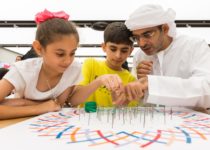The Kalima Reading Club, an initiative of the Department of Culture and Tourism – Abu Dhabi (DCT Abu Dhabi), organised a panel discussion exploring “Folktales from Spanish Gypsies” by Javier Asensio Garcia on 22 January. The session featured a number of writers and intellectuals, as well as many visitors with an interest in reading and culture.
The session, held at Manarat Al Saadiyat, Abu Dhabi, featured Dr. Dheya Al Kaabi, Professor of Literary Criticism and Narratives at the University of Bahrain, Emirati writer and novelist Lulwa Al Mansouri, author and playwright Saleh Karama, young Emirati writer Eman Al Yousuf and Emirati writer Mohsen Sulaiman.
Spanish band Cositas Buenas also featured at the session, performing a piece depicting the gypsies who inhabited ‘the lowlands of Andalusia’, as portrayed in the book.
Saeed Hamdan Al Tunaiji, Director of the Publishing Department at DCT Abu Dhabi, inaugurated the event, underlining Kalima Book Club’s goals as an initiative launched by DCT Abu Dhabi’s Kalima Translation Project to promote reading.
Al Tunaiji said that the club strives to complement Kalima’s work by appealing to a diverse audience which brings together reading and culture enthusiasts of all ages, including children. “The club is not bound to a particular location. We go where the audience goes. The club exists wherever there are books,” said Al Tunaiji.
Participants in the session, which was moderated by Eman Al Yousuf, discussed the gypsy way of life, their characteristics, and their dedication to remain isolated from other communities, despite their constant travelling. This created their customs and traditions; a discontent with organised life which created a world of its own, with many interesting stories.
The speakers also touched on the origins of the gypsies, the speculation and popular stories surrounding the topic, and their image in Arab and Khaleeji culture, where they were locally referred to using many different terms. The featured guests also highlighted the similarities in the folk tales of the world’s different cultures, praising the book’s stories and suspenseful narrative style that make it one of the most important titles in comparative literature.
Members of the audience raised many questions, and praised the concept of the Kalima Reading Club, stating it was a significant addition to the cultural scene and a platform that motivates readers to network and benefit from the Club’s sessions.
Published by Kalima and translated by Dr. Abdul Hadi Saadoun, “Folktales from Spanish Gypsies”, contains 76 tales that the gypsies of Spain kept alive from generation to generation. The featured stories were classified as epic tales, fascinating tales, survival tales, tales about the search for gold, tales of long nights, tales about faith and beliefs, and tales about useful riddles.







